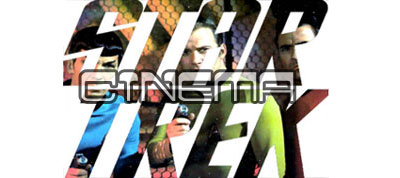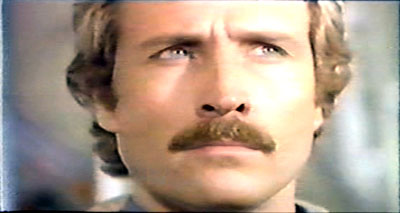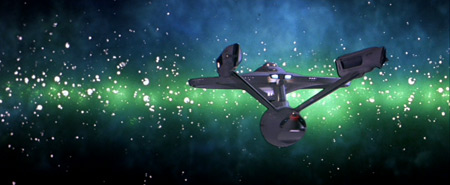Star Trek VI: The Undiscovered Country (1991)
Director: Nicholas Meyer
Starring: William Shatner, Leonard Nimoy, DeForest Kelley, James Doohan, Walter Koenig, Nichelle Nichols, George Takei, Kim Cattrall, Mark Lenard, Brock Peters, Kurtwood Smith, Christopher Plummer, Rosanna DeSoto, David Warner, Michael Dorn, Iman
![]()
![]() 1/2 (out of 4) (Director’s Cut)
1/2 (out of 4) (Director’s Cut)
![]()
![]()
![]() (out of 4) (Theatrical Cut)
(out of 4) (Theatrical Cut)

Another paint palette mishap
WARNING: SOME SLIGHT SPOILERS AHEAD.
Captain Hikaru Sulu of the starship Excelsior has just completed a 3 year mission cataloging gaseous anomalies (ooh, exciting!) when a large explosion is detected. Due to over-mining and lack of safety measures, the Klingon moon Praxis has exploded, leaving the Klingon home-world (Kronos) with apparently 50 earth years left of life. Seizing upon this opportunity, Mr. Spock opens a dialogue with Klingon Chancellor Gorkon resulting in planned peace talks between the United Federation of Planets and the Klingon Empire. Imagine Captain Kirk’s surprise when he finds out that his next mission is to escort the Klingons to the peace conference. Still sore after his son David’s death in Star Trek III, he is understandably uneasy about having to help broker a peace agreement with his sworn enemies, not to mention being rather pissed off at Spock for personally vouching for him. His response to Spock’s line “Jim, they are dying” is to “Let them die.”

You know, if you came down here we wouldn't need these walkie talkies.
So begins classic Trek’s swan song (featuring all of the original cast, at least), a somewhat-worthy ending for Kirk and crew after 12 years of movies (not counting the 3 years + countless time spent in syndication for the show). The creators of Trek, probably scared about the future after the disastrous response to Shatner’s Final Frontier, were probably glad that Star Trek’s 25th Anniversary was coming up, which they would use as an excuse to get another movie rolling. But this time they weren’t going to take any chances – the producers went back and got Nicholas Meyer, who was responsible for helming Star Trek II as well as co-writing the screenplay for Star Trek IV. Not everything went smoothly, however – Meyer’s partner in crime, Harve Bennett, split the scene because Paramount didn’t want to use his “Trek Academy” idea for the sixth movie, and both James Horner and Jerry Goldsmith said thanks but no thanks to working on the musical score. On a positive note, ILM returned to create the special effects, which are good for the most part (then again, anything is good compared to Trek 5).

Damn.... how was Morpheus able to keep these on?
The rest of the plot of Star Trek 6 centers around an assassination and frame-up of the Enterprise crew. Kirk and McCoy are arrested and sent to the Klingon penal colony Rura Penthe, while Spock and the rest attempt to solve the mystery of who the true murderers are, in the style of a popular detective that Spock thinks he’s related to. Thrown in the cast mix this time around is the Vulcan Lieutenant Valeris (Kim Cattrall), who graduated top of her class at Starfleet Academy; Cattrall’s performance here is much better than that of Kirstie Alley or Robin Curtis. David Warner, seen in the last film in a bit part, returns as Gorkon, and the heavy is a Klingon general named Chang, played by Christopher Plummer, who is well-versed in English literature. At an uncomfortable dinner gathering, we are told “You have not experienced Shakespeare until you have read him in the original Klingon.” Star Trek 6 is full of misappropriations like this, as when Spock talks about an old Vulcan proverb: “Only Nixon can go to China.” Later on, he’ll make a statement implying than one of his ancestors is the fictional character of Sherlock Holmes, while General Chang, with his eye-patch and evocation of Fu-Manchu, spews out literary quotations from just about every Shakespeare play I can think of. “I’d give real money if he’s just shut up,” says McCoy… at this point I felt the same.

Vulcans don't like chicken.
Star Trek 6 generally has a good balance of sci-fi action and character moments. The sequence on Rura Penthe, where Kirk ends up matching wits with a shapeshifter (Iman), is one of the film’s highlights. After a little flirting reminiscent of Kirk’s womanizing days, he ends up fighting a duplicate of himself (another throwback to a classic Trek episode The Enemy Within). “I can’t believe I kissed you,” says Kirk to his doppelganger, who replies “Must have been your lifelong ambition.” It’s a genuinely funny moment among the bad split-screen effects. The Kirk/Spock/Bones dynamic still works, and the ending space battle between the NCC-1701A and a Klingon Bird-of-Prey is admittedly pretty damn cool.

Tug of war and paintball later!
But there are other moments that are wince-inducing. Take the sequence where Uhura and the bridge crew need to fake Klingon dialogue when trying to get by a Klingon security outpost. You would think the Uhura, being the communications officer, would at least know a little bit of Klingonese, but instead Meyer insists that she embarrasses herself by badly reciting phrases from giant paper manuals. The universal translator would be recognized, you see, but then again, why not just have the computer tell you what to say and then repeat the words? For that matter, are giant books really the way to go when trying to translate a language in the 23rd century? Take another scene, originally cut from the theatrical release but reinserted in the director’s edition, where Colonel West goes over a plan with Starfleet brass to rescue the hostages, and he uses a giant flipchart! Jeez, even in the 20th century we had Microsoft PowerPoint. And why is he giving a classified briefing about a military rescue mission with the Romulan ambassador in the room? Why would a Klingon listening post not establish video communication? How come Kirk’s little locator patch, lazily applied to his shoulder, isn’t discovered? Why keep weapons in the galley? Why have a galley when everything is made with replicators? Are 23rd century doors really so flimsy that they can be knocked down by an overweight engineer? Was that really a Scooby Doo unmasking I saw at the conclusion (another “restored” scene for the video release)?

I would have gotten away with it if it wasn't for you meddling old people!
Yes, Star Trek 6, while enjoyable, is filled with the flaws of an egomaniac (Meyer this time instead of Shatner) who needed to be reined in, but because he directed the most loved film in the movie franchise, was probably surrounded by yes men who didn’t have a problem with his blatant attempts to yank the 23rd century back into the 20th. Meyer’s problem isn’t that he references classic literature and other historical events, it’s that he overdoses on it and it all becomes pedantic. He just can’t help himself – even the Klingon trial scene has General Chang channeling Adlai Stevenson, yelling out “Don’t wait for the translation! Answer me now!” which is bizarre considering that Kirk is no Valerian Zorin.

Vulcan Sex and the City
The idea that Star Trek VI is to be a metaphor for the end of the cold war/fall of Soviet Communism (with Klingons being the Russians, of course) kick-started by an intergalactic Chernobyl is a good one. But too often it seems like Meyer is trying to force square pegs into round holes; for example, the bigotry of everyone in the film seems overboard considering what we know of the characters. Scotty’s reference to “that Klingon bitch” and a crew member’s statement that “they all look alike” makes it appear that nobody learned anything in 300 years, surely a rebuke of Roddenberry’s intentions.

Kirk is trying to forget about that earlier kiss.
In the end, I welcome Star Trek 6 as a worthy conclusion for the original series characters, especially after the bad aftertaste of the previous sequel. Truth be told though, when all is said and done I wish that the Trek films had gone in a different direction – towards exploration of the unknown instead of showing more of the alien species (Klingons, especially) that we have known since Trek’s inception. Naturally, box office determines this more than anything, not me – so be it.
– Bill Gordon

I don't know who these guys are but I'm happy they could make the party!
| Star Trek VI: The Undiscovered Country (Remastered) [Blu-ray] |
|
|---|---|
The original theatrical cut finally makes its appearance on Blu-Ray. This version is superior to Meyer’s subsequent “director’s cuts” for a few reasons – the main one being that many of the groan-inducing sequences from those versions are not to be found. Specifically:
|
|

A look at the movies of Star Trek

